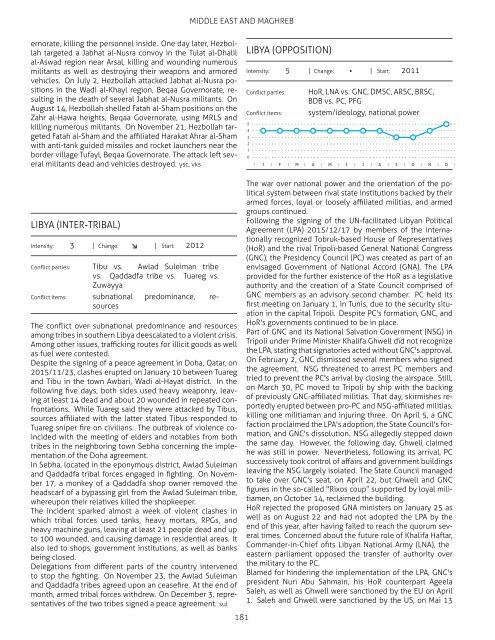ConflictBarometer_2016
ConflictBarometer_2016
ConflictBarometer_2016
You also want an ePaper? Increase the reach of your titles
YUMPU automatically turns print PDFs into web optimized ePapers that Google loves.
MIDDLE EAST AND MAGHREB<br />
ernorate, killing the personnel inside. One day later, Hezbollah<br />
targeted a Jabhat al-Nusra convoy in the Tulat al-Dhalil<br />
al-Aswad region near Arsal, killing and wounding numerous<br />
militants as well as destroying their weapons and armored<br />
vehicles. On July 2, Hezbollah attacked Jabhat al-Nusra positions<br />
in the Wadi al-Khayl region, Beqaa Governorate, resulting<br />
in the death of several Jabhat al-Nusra militants. On<br />
August 14, Hezbollah shelled Fatah al-Sham positions on the<br />
Zahr al-Hawa heights, Beqaa Governorate, using MRLS and<br />
killing numerous militants. On November 21, Hezbollah targeted<br />
Fatah al-Sham and the affiliated Harakat Ahrar al-Sham<br />
with anti-tank guided missiles and rocket launchers near the<br />
border village Tufayl, Beqaa Governorate. The attack left several<br />
militants dead and vehicles destroyed. ysc, vks<br />
LIBYA (OPPOSITION)<br />
Intensity: 5 | Change: | Start: 2011<br />
Conflict parties:<br />
Conflict items:<br />
HoR, LNA vs. GNC, DMSC, ARSC, BRSC,<br />
BDB vs. PC, PFG<br />
system/ideology, national power<br />
LIBYA (INTER-TRIBAL)<br />
Intensity: 3 | Change: | Start: 2012<br />
Conflict parties: Tibu vs. Awlad Suleiman tribe<br />
vs. Qaddadfa tribe vs. Tuareg vs.<br />
Zuwayya<br />
Conflict items: subnational predominance, resources<br />
The conflict over subnational predominance and resources<br />
among tribes in southern Libya deescalated to a violent crisis.<br />
Among other issues, trafficking routes for illicit goods as well<br />
as fuel were contested.<br />
Despite the signing of a peace agreement in Doha, Qatar, on<br />
2015/11/23, clashes erupted on January 10 between Tuareg<br />
and Tibu in the town Awbari, Wadi al-Hayat district. In the<br />
following five days, both sides used heavy weaponry, leaving<br />
at least 14 dead and about 20 wounded in repeated confrontations.<br />
While Tuareg said they were attacked by Tibus,<br />
sources affiliated with the latter stated Tibus responded to<br />
Tuareg sniper fire on civilians. The outbreak of violence coincided<br />
with the meeting of elders and notables from both<br />
tribes in the neighboring town Sebha concerning the implementation<br />
of the Doha agreement.<br />
In Sebha, located in the eponymous district, Awlad Suleiman<br />
and Qaddadfa tribal forces engaged in fighting. On November<br />
17, a monkey of a Qaddadfa shop owner removed the<br />
headscarf of a bypassing girl from the Awlad Suleiman tribe,<br />
whereupon their relatives killed the shopkeeper.<br />
The incident sparked almost a week of violent clashes in<br />
which tribal forces used tanks, heavy mortars, RPGs, and<br />
heavy machine guns, leaving at least 21 people dead and up<br />
to 100 wounded, and causing damage in residential areas. It<br />
also led to shops, government institutions, as well as banks<br />
being closed.<br />
Delegations from different parts of the country intervened<br />
to stop the fighting. On November 23, the Awlad Suleiman<br />
and Qaddadfa tribes agreed upon an ceasefire. At the end of<br />
month, armed tribal forces withdrew. On December 3, representatives<br />
of the two tribes signed apeace agreement. sul<br />
181<br />
The war over national power and the orientation of the political<br />
system between rival state institutions backed by their<br />
armed forces, loyal or loosely affiliated militias, and armed<br />
groups continued.<br />
Following the signing of the UN-facilitated Libyan Political<br />
Agreement (LPA) 2015/12/17 by members of the internationally<br />
recognized Tobruk-based House of Representatives<br />
(HoR) and the rival Tripoli-based General National Congress<br />
(GNC), the Presidency Council (PC) was created as part of an<br />
envisaged Government of National Accord (GNA). The LPA<br />
provided for the further existence of the HoR as alegislative<br />
authority and the creation of a State Council comprised of<br />
GNC members as an advisory second chamber. PC held its<br />
first meeting on January 1, in Tunis, due to the security situation<br />
in the capital Tripoli. Despite PC's formation, GNC, and<br />
HoR's governments continued to be in place.<br />
Part of GNC and its National Salvation Government (NSG) in<br />
Tripoli under Prime Minister Khalifa Ghwell did not recognize<br />
the LPA, stating that signatories acted without GNC's approval.<br />
On February 2, GNC dismissed several members who signed<br />
the agreement. NSG threatened to arrest PC members and<br />
tried to prevent the PC's arrival by closing the airspace. Still,<br />
on March 30, PC moved to Tripoli by ship with the backing<br />
of previously GNC-affiliated militias. That day, skirmishes reportedly<br />
erupted between pro-PC and NSG-affiliated militias,<br />
killing one militiaman and injuring three. On April 5, a GNC<br />
faction proclaimed the LPA's adoption, the State Council's formation,<br />
and GNC's dissolution. NSG allegedly stepped down<br />
the same day. However, the following day, Ghwell claimed<br />
he was still in power. Nevertheless, following its arrival, PC<br />
successively took control of affairs and government buildings<br />
leaving the NSG largely isolated. The State Council managed<br />
to take over GNC's seat, on April 22, but Ghwell and GNC<br />
figures in the so-called ''Rixos coup” supported by loyal militiamen,<br />
on October 14, reclaimed the building.<br />
HoR rejected the proposed GNA ministers on January 25 as<br />
well as on August 22 and had not adopted the LPA by the<br />
end of this year, after having failed to reach the quorum several<br />
times. Concerned about the future role of Khalifa Haftar,<br />
Commander-in-Chief ofits Libyan National Army (LNA), the<br />
eastern parliament opposed the transfer of authority over<br />
the military to the PC.<br />
Blamed for hindering the implementation of the LPA, GNC's<br />
president Nuri Abu Sahmain, his HoR counterpart Ageela<br />
Saleh, as well as Ghwell were sanctioned by the EU on April<br />
1. Saleh and Ghwell were sanctioned by the US, on Mai 13


